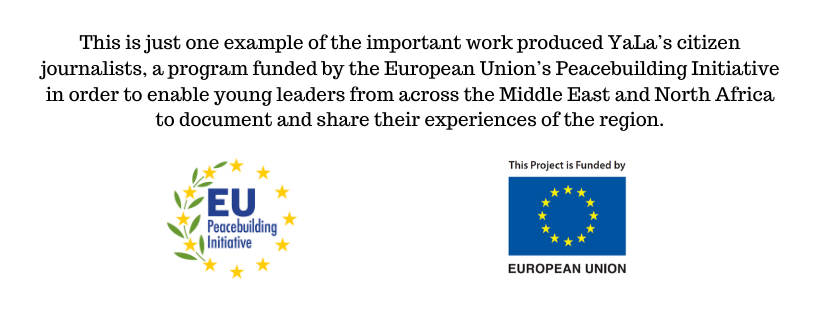Unlikely Encounters by Moe Azraq, Jordan
On a beautiful spring evening in Haifa, I was sitting outside and reading a book at a cafe called Elika while waiting for my friend Daphy to come and pick me up to go to a Seder (Passover dinner) at her aunt’s house in Nahariya, when a group of “48 Palestinian” men and women (Palestinians who live as citizens in Israel) walked into the cafe to watch a soccer match. The group was relatively young, in their late 20s to early 30s, I would say. One of them came out and asked if she could take a chair from my table as they needed one inside for her group. She looked at the book I was reading, Chicago, an Arabic novel by Egyptian novelist Alaa Al-Aswani, and asked: what is it about?
I responded: A novel about the lives of three Egyptian students at the University of Illinois. “Is it good?”, she followed.
I said: Yeah, it’s interesting! I am enjoying it.
She replied: “Your accent, it’s not from around here! Where are you from?”
I responded with a smile, ”I am from Amman, but have been living and studying environmental science on a kibbutz in the south called Ketura.”
She said: “ Oh yeah! The Arava Institute, I know of it! Cool!”
While her Arabic was admirably impeccable, I did notice a slight accent in it, and so I said: Your accent as well. Your Arabic is admirably impressive, but it’s not native. Where are you from? She smiled and said: I am from Haifa, but I am Jewish. I grew up with these guys and they are my best friends, so we speak in Arabic all the time!
I paused for a second — and perhaps a brief background here might help explain my pause. Palestinians and Israelis, whether inside Israel, in the West Bank or Gaza have lived in various levels of segregation that started to become visible in the late 1980s and intensified in the early 2000s.
I then said: WOW! This should not be rare! But it sadly very much is! It warms my heart that people like you exist amidst such a divide that we live and breathe here everyday!
When I arrived at Daphy’s aunt’s house in Nahariya, Daphy’s family was very warm and welcoming. While I was the only non-Jewish person invited to the dinner, I was made to feel immediately at home. The family was secular, and like many Jewish families was scattered all over the globe. Another aunt of Daphy’s flew in with her husband from Denmark for the holidays. Many of the members, specially those from outside, had not memorized the Seder rituals, so they picked up a book and read together. It was beautiful.
This was not my first Seder, I had been invited to ones in the US, but it was my first one in Israel. It was special. As we drove back to Daphy’s place in Haifa afterwards, I expressed a mixed feeling of gratitude for the invitation but also some sadness for how very few Arabs get to have such experience and that very few Jews get invited to a Muslim Eid feast.
While as a herbivore, I am not particularly thrilled by the massive slaughter of animals which happens over Eid and wish for it to become more sustainable, the coming together, the sharing and love are a beautiful manifestation of heritage and culture. If we had more Jews and Arabs feel welcome at each other’s homes like I did at Daphy’s aunt’s, perhaps we’d see more humanity and less violence in the world’s oldest and perhaps most intractable conflict!
———————————–






Leave a Comment
Want to join the discussion? Feel free to contribute!